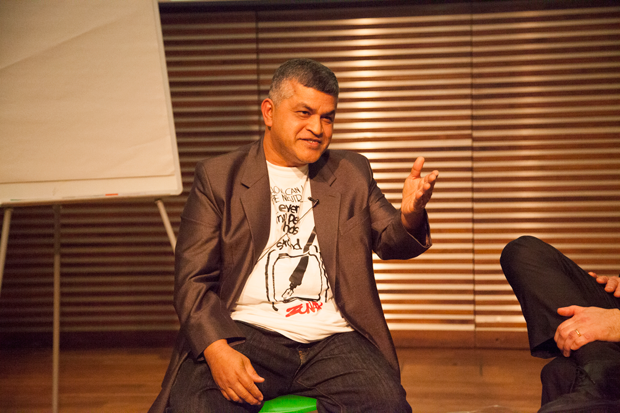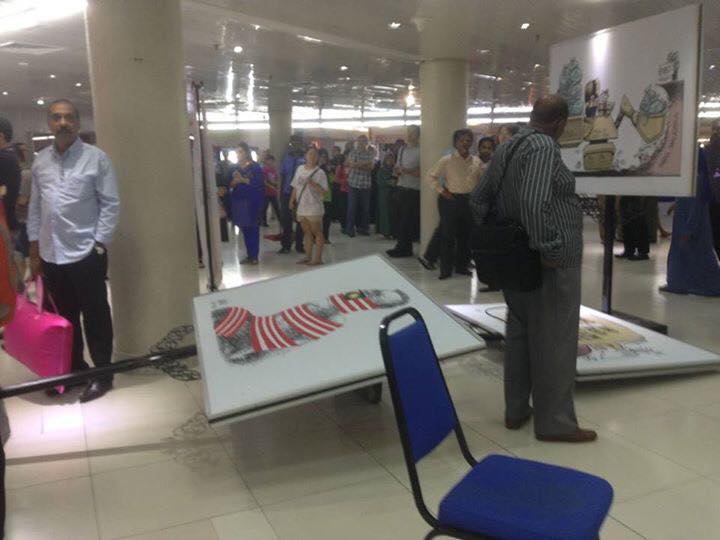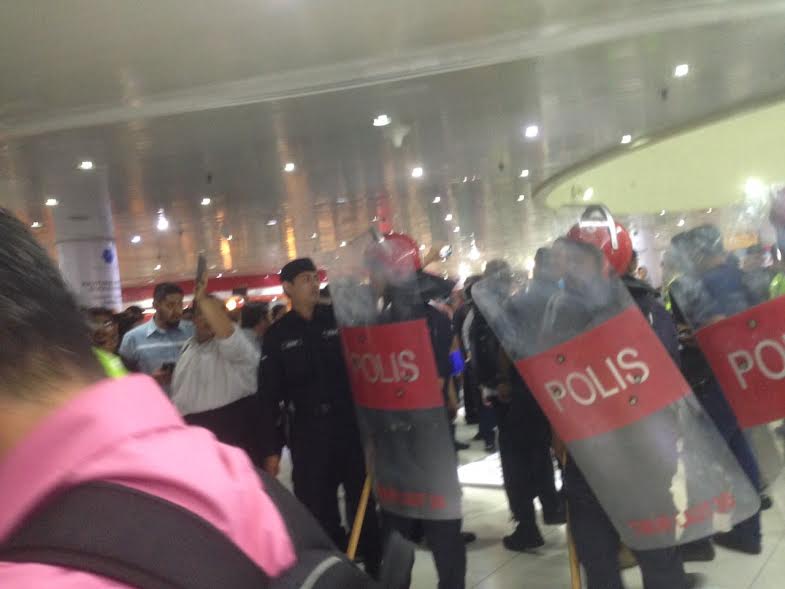Index relies entirely on the support of donors and readers to do its work.
Help us keep amplifying censored voices today.
[vc_row][vc_column][vc_media_grid grid_id=”vc_gid:1532952362622-3cdbf71d-d6a0-4″ include=”101642,101641,101640,101639,101638,101637″][vc_column_text]
For Malaysian cartoonist Zunar, three years of constitutional challenges pale in comparison to the 43 years imprisonment that were on the line. But after a legal battle active since 3 April 2015, Zunar’s nine sedition charges were dropped on Monday 30 July 2018. With three days in court still to follow, the victory is one of several the artist is seeking as an advocate for free expression and the repeal of the Sedition Act.
Implemented during British rule and strictly enforced by the regime of former PM Najib Razak, the Sedition Act spared no government critic whether artist, activist or MP. Under newly elected PM Mahathir Mohamad, the Attorney General’s Chambers (AGC) announced that it would review all ongoing sedition cases starting 13 July.
In the first of his four court dates this week, Zunar was acquitted along with MP Sivarasa Rasiah of the People’s Justice Party (PKR) and civil rights lawyer N. Surendran. All three individuals were charged for denouncing the Razak regime’s conviction of opposition leader and PKR member Datuk Seri Anwar Ibrahim for sodomy.
Surendran faced charges on 19 August 2014 after writing a seditious press release entitled “Court of Appeal’s Fitnah 2 written judgement is flawed, defensive and insupportable.” Zunar was charged not for his political cartooning but for tweets that insulted the judiciary after Anwar’s conviction. Both were charged under Section 4(1)(c) of the Sedition Act for “publish[ing], […] distribut[ing] or reproduc[ing] any seditious publication” while Sivarasa was charged under Section 4(1)(b) for “utter[ing] any seditious words” in a speech at the March 2015 “Kita Lawan” (“We Fight”) rally in protest of Anwar’s imprisonment.
After their hearings on Monday in Kuala Lumpur, prosecutors reported that the AGC would not pursue their respective cases any further. Zunar’s victory was widely celebrated by his global fanbase. Human Rights Watch legal advisor Linda Lakhdhir tweeted “Excellent news that the Malaysian govt is dropping sedition charges against @zunarkartunis and @nsurendrann. Now it should drop all remaining sedition charges and repeal the law.”
Indeed, the Pakatan Harapan coalition the government is now under promised to repeal the Sedition Act in its 2018 election manifesto. As Zunar told Index earlier this month, “If they really want to abolish the Sedition Act together with other laws related to freedom of expression, freedom of speech, they at least need to suspend it first before they continue.”
His upcoming court dates, 31 July-2 August, concern a suit the cartoonist filed after he was arrested and his artwork and 1300 of his books were confiscated in a police raid during an exhibition in October 2016. Although there have not been any similar cases since Mahathir came to power, Zunar hopes to use his cartooning and advocacy to serve as a watchdog and hold the government to their commitments on free expression.
[/vc_column_text][/vc_column][/vc_row][vc_row][vc_column][vc_basic_grid post_type=”post” max_items=”12″ style=”load-more” items_per_page=”4″ element_width=”6″ grid_id=”vc_gid:1532952291084-c9001237-0b1b-4″ taxonomies=”4218″][/vc_column][/vc_row]
[vc_row][vc_column][vc_column_text]

Malaysian cartoonist Zunar is facing charges under a colonial era Sedition Act. (Photo: Sean Gallagher/Index on Censorship)
Nine banned books. Nine charges of sedition carrying the maximum penalty of 43 years imprisonment. Countless attacks, raids and arrests. These were the consequences of Malaysian cartoonist Zunar’s cartoons and tweets decrying government scandals and misdealings under former prime minister Najib Razak.
Under Razak, Malaysia’s “Man of Steal,” Zunar published volumes of cartoons criticising the prime minister and his wife for their lavish lifestyle and corrupt rule at the expense of the Malaysian people. The government justified its crackdown on his works early on, reasoning that they “influence the public to revolt against the leaders and government policies” and are “detrimental to public order” in 2010.
A travel ban was placed on Zunar on 24 June 2016. In 2015, he was charged under Malaysia’s Sedition Act, a 1948 remnant of British colonial rule used by the Malaysian government to silence dissenting voices like Zunar’s. He now awaits four days in court, starting 30 July.
The cartoonist was still in the process of mounting a constitutional challenge to the Sedition Act for these charges when opposition leader Mahathir Mohamad toppled PM Najib Razak in national elections on 9 May 2018. The same day, the new government lifted the travel ban on Zunar and has placed one on the former PM while investigating his role in Malaysia’s global corruption scandal, 1MDB.
For the first time in two years, Zunar could travel to London last week, where he met with ARTICLE 19 and Amnesty International officials. He continues to challenge his travel ban because the old government cited “special reasons,” not law, to justify it. With his challenge active until the travel ban trial on 22 October, Zunar emphasised “I want to do this because I think I am being victimised but I also want the court to make a ruling that no government can use this [justification] anymore, including the new government. [Otherwise] they may use this again in the future for the activists the government doesn’t like.”
The government has faced ongoing international pressure from organisations like Index and ARTICLE 19 as well as UN Special Rapporteur on cultural rights, Karima Bennoune, to drop the sedition charges against Zunar. On 13 July, the Malaysian Attorney General’s Chambers (AGC) announced that they will begin a review of all ongoing sedition cases, citing the strength of the cases and evidence as determinants of whether the charges will be upheld.
In the meantime, Zunar has vowed to continue cartooning and advocating for the repeal of the very laws that silence him and other government critics in Malaysia: the Sedition Act, the Printing and Press Act and the Fake News Act. Despite national celebration of the new government, he remains skeptical. “It’s too early to put any hope on what they say because I think new governments always makes good promises but they need to abolish [the Sedition Act] because this is what the promise during the election campaign was” he said.
Zunar spoke with Index’s Shreya Parjan about the current status of his case.
Index: You’ve faced the current set of sedition charges since 2015. How have you appealed and challenged them since then? How does your current appeal differ from that of your case in 2010?
Zunar: It was started in 2010, yes, I was arrested around that time but they didn’t charge me for that so 2010 is different. I have few other sedition charges, okay so 2010 one, 2015, 2016 two times but the only one they charged was in 2015. This is the one they’ve got me in court for. The others they just investigated and arrested and I spent time in police lockup for other cases but only one they are really bringing to court.
The [2015] charge is still going on, the next court date is 30 July. This is very long, from March 2015 until now, the court is still unable to start because at the same time when they brought me to court, my staff and several activists who have been charged with sedition, we filed suit to challenge the constitutionality of the sedition act. The separate court had to deal with that first.
And finally, early this year, the court has made a decision that our challenge is irrelevant and so there’s no issue. So finally, now the court is going to start and also now its a new date: on 30 July. But we have to also understand that politically, and now we have a new government, all my charges were brought by the old government, so we’ll see what happens on the 30 of July.
Index: Since the Attorney General’s Chamber announced on 13 July that they will be reviewing all ongoing sedition cases, what expectations do you have for your own case?
Zunar: Now, the new parliament session just started today [16 July] and I have to wait and see. It’s too early to put any hope on what they say because I think new governments always make good promises but they need to abolish [the Sedition Act] because this is what the promise during the election campaign was. But just a few days ago, another activist was challenged under Sedition so this is why I say it’s important to see the action rather than the words now.
Index: What changes in the environment for free expression do you anticipate seeing under PM Mahathir Mohamad?
Zunar: I have to say that until they [abolish] it, I’m still concerned. If they’re really serious, they will abolish this law and several laws. If they really want to abolish the Sedition Act together with other laws related to freedom of expression, freedom of speech, they at least need to suspend it first before they continue. They have to show that “we are really serious, that we have to do it, but for the time being, why don’t we suspend theis law first.” For me, if you really have a political will to do it, you have to show it. But I don’t know, it’s too early to say. Until they do it, I cannot say anything about it and there’s no positive sign for it.
The other law also involved in this is the Printing and Press Act, the law the government widely used to control the media. There’s also the Fake News Act, which was introduced just before the previous election, and the Official Secrets Act. Two of these laws were used against me and the other two were used against activists who tried to expose or tried to reveal corruption or wrongdoing by the government so the government has to, if they’re serious about freedom of expression, they have to abolish these laws.
There’s some talk of review, but I say no, there’s no excuse, they have to go for it. We have to wait for the parliament, whether this will be done in this parliament session which is going to make their decision over one month. We have to wait for this to see whether this new government is really serious about it or if they might use it again.
Index: What has the former government’s crackdown on those you worked with (publishers, webmaster) looked like? What implications could the new government’s review of your case have for them?
Zunar: There was an incident where the police arrested me when I did an exhibition in October 2016 and they took all the artwork and also 1300 books. I filed a suit against them and the case will be heard during the trial which is over four days: 30 July-2 August. At the same time, two of my assistants have been charged and their charges still continue and there’s no sign that the government will drop the charges. They have been charged with obstructing the police officers from carrying out their job. I think they had one court session last week so they still continue. There’s no sign that the government will drop the charge.
Previously, three of my printers have been raided under the Printing and Press Act and they were given a very strong warning that if they print my book again, they will be charged under Sedition and their licenses will be revoked. Also, my webmaster was investigated under the Sedition Act, my office has been raided several times and my sales assistants have been arrested.
What the police did is use a culture of fear. They create fear. They go and they didn’t really bring these guys to court, but they use harassment and the law that they will be charged if they continue, to scare people. But because we have a new government, so far there are no cases like that, so I think that the situation is maybe changing, I don’t know.
Index: What role do you see your cartoons playing in your advocacy for the repeal of the Sedition Act and other legislation that has constrained your work in the past?
Zunar: I think in my recent trip to London [last week] I spoke to ARTICLE 19 and Amnesty International and I hope for them to make a statement. It’s good for international organisations to give pressure to the government during the parliament session to abolish these outdated laws.
My cartoons reflect the issues of a country during that time, any time. If I want to do the same level of cartooning, the one I did during the previous government is a different type of cartoon. Now I can do more reminding and giving pressure to the government in a positive manner. Because in Malaysia right now, we just chose a new government, everyone is very happy, the people are very happy, this is what they expect and at the same time, civil society and activists like me have to remind the government that winning doesn’t mean you win everything or everything already changed.
So many things need to be done to keep the promises [that were made during the election]. As a cartoonist, we simply have to wait for the issues. Like during the parliament, if they don’t act, we have to come up with a cartoon to show that this is what you promised and you are not fulfilling your promise.
Talking about levels, previously what I did was to fight through cartoon. This is one level up from what normal cartoonists do around the world. Normal cartooning around the world is to criticise the government of the day. That is for those who think that the government is a bit undemocratic. Last time, what I did was fight through cartoon. But now, the people of Malaysia did win and there’s so much hope for this new government and they’re very positive about it. I cannot simply come and fight through cartoon again at this time.
Now I have to do positive cartoons reminding and being a watchdog for the government. I think changing the mindset is very important also. It’s not about changing individuals, you have to change the mindset in the society, to show that cartoons can do the job too. In terms of what I’m going to do, I think I need to go along with this achievement and be a watchdog to the government, which is a totally different role of cartooning compared to the one I did with the last government.[/vc_column_text][vc_media_grid element_width=”3″ grid_id=”vc_gid:1532428297196-711fc435-d06c-1″ include=”101641,101640,101642,101636,101635,101639,101638,101637″][/vc_column][/vc_row][vc_row full_width=”stretch_row_content”][vc_column][three_column_post title=”Malaysia” full_width_heading=”true” category_id=”130″][/vc_column][/vc_row]
[vc_row][vc_column][vc_column_text]
Malaysian cartoonist Zulkiflee Anwar Ulhaque, aka Zunar, was arrested on 26 November under the Sedition Act for his cartoons which are deemed insulting to the country’s prime minister Najib Razak.
The artist was questioned under the penal code under suspicion of intentionally humiliating a person. He was released the next day.
“Even though I have been released, the harassment from the Malaysian government is far from over. I have to report back to the police in Penang on 27 December 2016 for further investigation. And yesterday (26 November), two peeple who assisted me in organizing the exhibition were also called up by the police for questioning,” the cartoonist said in a statement.
On 25 November Zunar was forced to end his three-day exhibition after only a few hours when a group of “pro-government thugs,” believed to be a part of the United Malays National Organisation, physically assaulted the cartoonist and damaged his displayed work. “They pulled my shirt and threw a punch at me,” Zunar told Index, “but people came and rescued me.”
The Malaysian government has long attempted to silence the cartoonist, who currently is awaiting trial on nine charges of sedition, which carry a potential 43-year jail term, for his cartoons government-critical cartoons. The trial is set for 24 January 2017 and Zunar is currently on bail.
A travel ban was placed on Zunar on 24 June of this year but was Zunar only became aware of the limitation when he was held by immigration police at the Kuala Lumpur International Airport when attempting to leave Malaysia on 17 October.
Zunar has been arrested twice before, once for two days in 2010 for publishing his book Cartoon-O-Phobia, and again for three days in 2015 for violating the Sedition Act.
The Sedition Act, which was put in place to silence opposition to British colonial rule in 1948, has become a popular way for the Malaysian government to silence critical voices such as Zunar. The award-winning cartoonist has been challenging the law for years.
“I can smell that the 10th charge of the Sedition Act is on the way. I am already facing 9 charges under that draconian act and the trial is set to be on 24 January 2017,” Zunar said.[/vc_column_text][/vc_column][/vc_row][vc_row][vc_column][vc_basic_grid post_type=”post” max_items=”4″ element_width=”6″ grid_id=”vc_gid:1480410671694-9cbae1a6-e66d-2″ taxonomies=”4218″][/vc_column][/vc_row]
[vc_row][vc_column][vc_column_text]
Update: Since this article was published, Zunar has been arrested on charges of sedition.
Zulkiflee Anwar Haque, aka Zunar, a Malaysian political cartoonist, continues to face harassment from the government and its supporters due to his work.
His cartoons and books have previously been banned and confiscated for being allegedly “detrimental to public order”, he is to stand trial on nine charges of sedition in January, which carries a 34-year sentence if he is convicted, and he is currently banned from leaving the country.
Earlier today a mob of 30 people – who he called “pro-government thugs” – surrounded him at the opening of his new exhibition of satirical cartoons, threatened him and damaged some of his artwork.


“They were very hostile for the first 20 minutes because I was alone with friends,” Zunar told Index. “They pulled my shirt and threw a punch at me, but people came and rescued me.”
As the situation became more unmanageable, police were called in, followed by riot police, to contain the mob. No arrests were made.

“I was very scared but I stayed calm – I didn’t react,” Zunar added.
The exhibition had only been open for a few hours before being forced to close. Zunar has taken the decision to close the exhibition permanently due to safety concerns and told Index he will seek more secure locations for future exhibitions.
Such attacks are becoming more common in Malaysia, as being in opposition to the government becomes ever-more difficult. Last week a similar crowd interrupted a speech by the opposition MP on Khalid Samad on the grounds of the county’s Parliament.
Last Friday, on the eve of a massive Bersih protest in the Malaysian capital of Kuala Lumpur, the activist Maria Chin Abdullah was arrested, prompting many thousands of people to take to the streets in yellow t-shirts to demand her release.
Protesters are also calling for free and fair elections and for the Malaysian Prime Minister, Najib Razak to resign.
“The Malaysian government is now a minority government, with the ruling party only receiving about 47% of the popular vote,” Zunar explained. “So the Malaysian government will now do anything they can to ensure they remain in power, including fostering and supporting this kind of chaos and attack pro-democracy activists.”
Talking about his upcoming trial – which was due to take place back in November 2015 – Zunar said: “I don’t put any hope in the system. I would like to highlight again that this is politically motivated. It’s not about the strength of the evidence against me, it’s not about how good the witnesses are, in Malysia it depends on the judges. And if we are lucky enough we will find one or two independent judges – that is the best we can hope for.”
Zunar is more than willing to stand trial, however, to highlight the abuses of freedom and democracy in Malaysia for all the world to see.
In the meantime, as ever, he will continue to draw.
 [/vc_column_text][vc_basic_grid post_type=”post” max_items=”4″ element_width=”6″ grid_id=”vc_gid:1480182362387-e768b001-afd7-3″ taxonomies=”4218″][/vc_column][/vc_row]
[/vc_column_text][vc_basic_grid post_type=”post” max_items=”4″ element_width=”6″ grid_id=”vc_gid:1480182362387-e768b001-afd7-3″ taxonomies=”4218″][/vc_column][/vc_row]